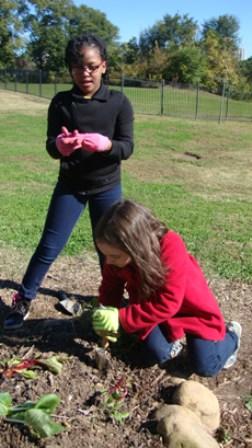
Section Branding
Header Content
These Kids Will Actually Ask You For Vegetables
Primary Content

If you walk around to the backyard behind Centennial Place Elementary School, don’t be surprised to see children planting kale in a vegetable garden, with the Atlanta skyline behind them.
Centennial Place Elementary is part of the Atlanta Public Schools’ Farm-to-School program, a learning garden program that teaches students how to grow and incorporate fresh produce into their daily diets.
Centennial Place Elementary opened its learning garden Friday for a tour that was hosted by Georgia Organics and the Captain Planet Foundation, two non-profits devoted to teaching environmental education.
“It’s easy to have a garden in a school,” says Leesa Carter, the director of the Captain Planet Foundation. “But sustaining a garden and a school garden program is the real work.”
The APS Farm-to-School program launched in 2006, and now includes more than 30 public schools in the city of Atlanta. The program’s cornerstone: use the garden as a context for teaching.
Students don’t only learn environmental and culinary skills by working in the garden. Teachers integrate the garden into the curriculum. For example, to teach a class about weather, a science teacher can organize a project about the types of vegetables that flourish in different temperatures.
Esther Green, a fifth grader at the school, says her favorite part of the garden is trying the new vegetables.
“We’ve tried sweet tomato wrapped in basil leaf. And we’ve tried a lolly pepper, which is a stick stuck into a big pepper and it’s delicious,” she said.
Ten-year-old Kendal Duff, who moved to Atlanta from Chicago, says she enjoys finally being able to garden outside.
“I used to garden at my house, but because of the weather in Chicago, it used to be bad,” she said. “We couldn’t plant anything. But now I get to see how fruits and vegetables can grow.”
Alice Rolls, the executive director of Georgia Organics, says the program works.
“We see results when we see kids chowing down on kale in the garden, and then going in and ordering it from the cafeteria,” she said.
This past year, the APS Farm-to-School program partnered with the Atlanta Falcons Youth Foundation. Together, both organizations made sure that the seven million meals served in the program included a local ingredient.
That emphasis on eating locally-grown ingredients doesn’t just benefit the students. The partnership’s goal is to increase sustainable farming in Georgia by supporting local farmers and building connections with the community.
“It’s hard to make a living as a farmer,” says Rolls. “By buying local, organic produce and other food, the program helps keep local farmers in business.”
While the Farm-to-School program is generating interest in a lot of communities both inside and outside of metro Atlanta, not every school has the resources to take part in the program.
“A lot of cafeterias aren’t equipped to prepare fresh food,” says Rolls. “They don’t have the labor. They don’t have the equipment. So we have to convince people, but we have to help them get the resources to do this long term.”
Despite these obstacles, Rolls says that advocating for programs like Farm-to-School will help engage the local community.
“I actually think farm to school is going to help us grow a much more literate community [and] generation that has culinary skills. [One] that has garden skills, and is reconnecting back to the food and the sources of our food,” she said.
Contributors: Shauna Stuart
Tags: Georgia Organics, farm to school, Captain Planet
